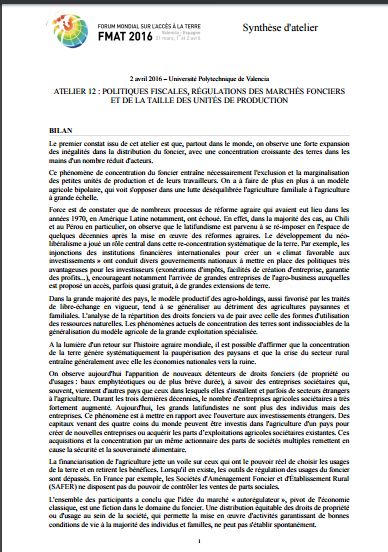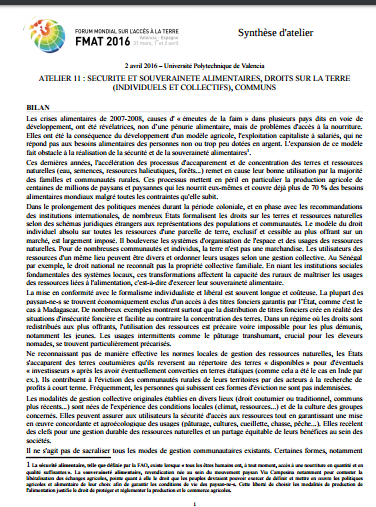Location
The goal of the WFAL 2016 had been to organise a world forum in 2016 to address the major issues linked to unequal access to land, natural resources (see The Call). Finally, the global assembly took place in Valencia, Spain (31st March, 1-2 April 2016) with more than 400 participants from 70 countries from today at the Global Forum on Access to Land and Natural Resources.
Ten years after the World Forum on Agrarian Reforms (Valencia, Spain, 2004) and the International Conference on Agrarian Reform and Rural Development (Porto Alegre, Brazil, 2006) the trends seemed unchanged if not worse.
Making a precise assessment of the situation had been imperative. An evaluation of the short and long terms consequences had been essential. It couldn’t must ignore none of the great economical, social, political and environmental prejudices due to the ongoing processes. It was the condition to identify responses able to solve the problems.
Implementing such an analysis had been possible according to the signatories of the WFAL 2016 Call, if citizens from every continent and the organizations in charge of representing or guaranteeing their interets could effectively debate into a structured and contradictory process: farmer and other civil society organisations, governmental organisations, indepedant or public research institutes.
The WFAL 2016 Call aimed at creating the conditions necessary for such a debate, with the guarantee that each one’s point of view and analysis had been taken into consideration by all, towards the invention of the most constructive proposals.
Members:
Resources
Displaying 6 - 10 of 25ATELIER 12 : POLITIQUES FISCALES, RÉGULATIONS DES MARCHÉS FONCIERS ET DE LA TAILLE DES UNITÉS DE PRODUCTION
Le premier constat issu de cet atelier est que, partout dans le monde, on observe une forte expansion des inégalités dans la distribution du foncier, avec une concentration croissante des terres dans les mains d’un nombre réduit d’acteurs.
Ce phénomène de concentration du foncier entraîne nécessairement l’exclusion et la marginalisation des petites unités de production et de leurs travailleurs. On a à faire de plus en plus à un modèle agricole bipolaire, qui voit s’opposer dans une lutte déséquilibrée l’agriculture familiale à l’agriculture à grande échelle.
WORKSHOP 12: FISCAL POLICIES, REGULATING PROPERTY MARKETS, REGULATING THE SIZE OF PRODUCTION UNITS
The first observation from this workshop is that everywhere in the world, we are seeing strong growth in the inequalities of the distribution of land, with a growing concentration of land in the hands of a reduced number of players.
This land concentration phenomenon unavoidably leads to the exclusion and marginalization of small production units and their workers. We are dealing with an increasingly bipolar agricultural model which opposes family agriculture and large scale agriculture in an unequal fight.
ATELIER 11 : SECURITE ET SOUVERAINETE ALIMENTAIRES, DROITS SUR LA TERRE (INDIVIDUELS ET COLLECTIFS), COMMUNS
Les crises alimentaires de 2007-2008, causes d’ « émeutes de la faim » dans plusieurs pays dits en voie de développement, ont été révélatrices, non d’une pénurie alimentaire, mais de problèmes d’accès à la nourriture. Elles ont été la conséquence du développement d’un modèle agricole, l’exploitation capitaliste à salariés, qui ne répond pas aux besoins alimentaires des personnes non ou trop peu dotées en argent. L’expansion de ce modèle fait obstacle à la réalisation de la sécurité et de la souveraineté alimentaires1.
WORKSHOP 11: FOOD SOVEREIGNTY AND FOOD SECURITY, RIGHTS OVER LAND (INDIVIDUAL AND COLLECTIVE), COMMONS
The food crises of 2007-2008, the cause of the “hunger riots” in several so-called developing countries, did not reveal a food shortage but problems accessing the food. These problems were the result of the development of an agricultural model, capitalist operation with workers, that does not meet the food-related needs of individuals with no or little money. The growth of this model is hindering the achievement of food sovereignty and security1.
ATELIER 10 : DIRECTIVES VOLONTAIRES POUR UNE GOUVERNANCE RESPONSABLE DES RÉGIMES FONCIERS APPLICABLES AUX TERRES, AUX PÊCHES ET AUX FORÊTS DANS LE CONTEXTE DE LA SÉCURITÉ ALIMENTAIRE NATIONALE (DV) : QUELLE MISE EN ŒUVRE SUR LE TERRAIN ?
Les DV n’ont pas force d’obligation indérogeable. C’est un outil de référence mobilisable pour faire évoluer les politiques et pratiques de gouvernance relatives à la tenure des régimes fonciers applicables aux terres, pêches et forêts. Leurs préconisations bénéficient d’une forte légitimité puisqu’elles ont réuni, fin 2012, les signatures des États membres du Comité de la Sécurité Alimentaire Mondiale (CSA), suite à un processus d’élaboration qui a accordé une place importante à l’expression de la société civile mondiale.




